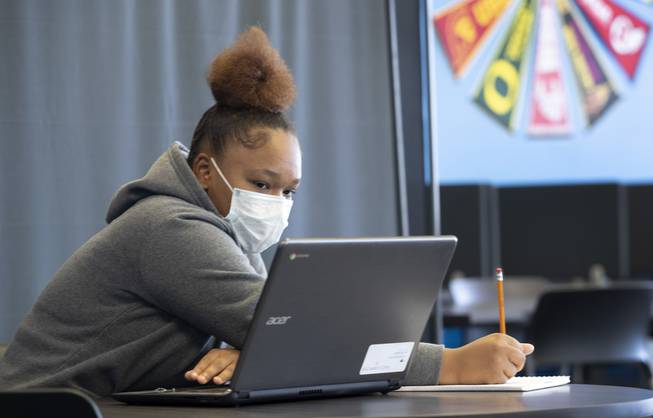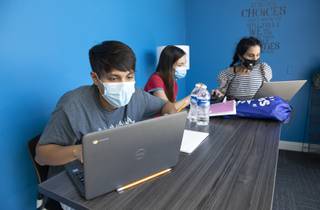
Jada Watson, a high school senior takes notes as she takes an online course at the Acceleration Academy, Craig Road campus, Wednesday, Sept. 15, 2021.
Sunday, Sept. 19, 2021 | 2 a.m.
Jada Watson is not the archetypal high school student.
She only takes one class every few weeks while juggling long work hours at a Las Vegas cleaning service. Then, in December, she will graduate with a high school diploma, hoping to attend a local college to stay close to her family.
Watson, however, does not need to step foot on a Clark County School District campus to complete her high school coursework. She instead is one of nearly 800 locals enrolled at an Acceleration Academy, a nationwide education program that grants students who did not graduate or dropped out of high school the opportunity to complete their coursework for a diploma at a pace suitable for them.
Before Watson started her classes at Acceleration Academy in August, she had attended Legacy High School in North Las Vegas. She still needed a few extra credits to graduate, but rather than returning to Legacy — where the traditional school hours were not compatible with her work schedule — Watson enrolled in the academy. Students at the academy, who are called “graduation candidates,” complete one class in three to four weeks at 24 hours per week. Others may go forward at their own pace and finish the class more quickly or take more than one class, said Wendy Thompson, district director for the academy.
Half of the candidates’ hours are virtual while the other half is in-person, and students have the ability to adjust this schedule based on their availability. Classes are in a wide range of subjects, such as math or physical education.
The program’s slowed pace and flexibility works better for Watson’s schedule because she works 8:30 a.m. to 5 p.m.. After work, she completes three to five assignments at her own pace, she said.
“It’s so much better than a regular online school,” said Watson, 18. “Everyone here is like family. Everyone’s friendly. Everyone’s open.”
Many of the academy’s students are juggling the rigors of working full-time or raising a young child, using the academy’s flexible schedule to finish their studies.
“There are so many students in Clark County, unfortunately, that just don’t finish a lot of the times due to a lot of different circumstances,” said Hashima Carothers, assistant district director of the Academy. “It’s definitely beneficial, and I think a lot of the students have aspirations to do something bigger and better themselves.”
Thompson said the academy partners with CCSD to identify students that have recently dropped out of its high school. The academy contacts these students to inform them of the program and hopefully get them started toward earning their CCSD diploma.
The academy offers three orientation sessions a week, she said, and a student can become enrolled as quickly as the day of their orientation.
Keiana White, another graduate candidate, takes physical education, where she can select between activities like running exercises or basketball jump shots. An avid basketball player, White chose the latter. She answers questions about the activities afterward to earn the credit.
Like Watson, White is also employed. Her daily shifts from 4 p.m. to 10 p.m. in retail conflicted with her school’s schedule, so she supplements her final credits with work at the academy. She aims to graduate in February after starting at the academy in August.
“It’s more personal for me because I can get my work done at my own pace,” she said. “I’m able to reach my goals by being in this school.”
The graduate candidates are guided by teachers, called content coaches, and advocates, who provide them with support both academically and otherwise. The academy, for example, provides bus passes so students can attend lessons in person, as well as on-site breakfast and lunch and laptops for their studies. The academy has two locations, at 2020 W. Craig Road in North Las Vegas and 2450 E. Bonanza Road, east of downtown Las Vegas. A new location, in southeast Las Vegas off of Tropicana Road and Boulder Highway, is scheduled to open this fall.
All classes feature one-on-one learning. Advocate Kiaira Taylor sets a students’ schedules and monitors their activity, including checking if they are meeting their requirements of three to four logins and at least 30% progress in their courses per week.
Before the pandemic, the academy still offered its current 12 hours of virtual classes. Taylor said that when the academy shifted completely online in March 2020 because of the pandemic, she discovered just how beneficial virtual learning was.
“I think it helped a lot with them more because it fits better with their schedule, so we won’t have to focus on the coming-onsite aspect,” she said. “At home, I saw a better increase in their progress and their attendance.”
Akili Franklin flitted between several public schools in the area before coming to the academy. Those traditional schools did not have the environment nor support system that he said would support his academic achievements. So far, his favorite subject is English.
“I learned some things I have never learned before,” he said. “Long story short, English was my favorite course, even though it was the hardest.”
There are 774 graduate candidates across the academy’s two Southern Nevada locations, a number that Thompson said will likely increase when the academy opens its third location . Of the current students, there is an approximate 50% split between men and women, with a small portion of students that identify as nonbinary.
Additionally, 41% of all students in the Clark County Acceleration Academies are Hispanic or Latino, 25% are Black, 16% are white, and 11% are two or more races. These students arrive from across the valley, but they primarily live in North Las Vegas and west Las Vegas.
The United States Department of Education reported that the abrupt switch to virtual learning from March 2020 to April 2021 caused significant learning losses for students of color, students from low-income families and LGBT students. Additionally, historically Black colleges and universities, Minority Serving Institutions and Tribal Colleges and Universities saw decreases in their enrollments, outpacing enrollment declines in predominantly white institutions in some cases.
Acceleration Academy aims to bridge this loss by giving students a second shot at their education that is not through a General Educational Development (GED) diploma, Thompson said, but an actual CCSD diploma.
After completing their high school coursework through the academy, students can take several avenues — they can attend college, technical school, military training or find a job, she said. On Sept. 25, the Academy is hosting two graduation ceremonies for 40 students, Thompson said.
“What we do is about equity and access,” Thompson said. “Every single one of those kids matters.”
Yvette Williams, founder and chair of the Clark County Black Caucus, partnered with the Academy because of its roots in equitable access to education. The caucus supports Black students and other students of color in securing equitable education opportunities, Williams said.
In the face of heated racial tensions across the country, Williams said Black students may not feel empowered or safe in their school spaces. This could cause them to drop out or get their GED instead, which employers or colleges may not respect as much as an official high school diploma, she said.
“I think [the Academy is] a great partner for CCSD because they can offer something that CCSD is not able to,” she said.

